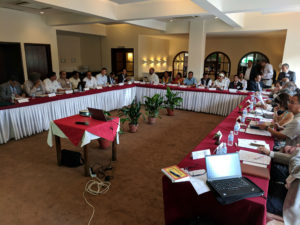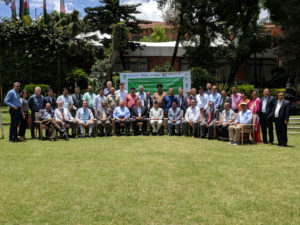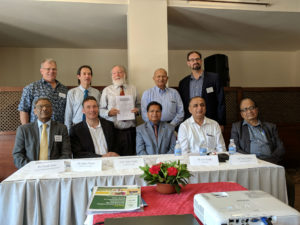Blog post prepared by Dr. Adam Loch
Centre for Global Food and Resources (GFAR) led Australian Centre for International Agricultural Research (ACIAR) funded project, “Value chain and policy interventions to accelerate adoption of zero tillage in rice-wheat farming systems across the Indo Gangetic Plains” had its final workshop activity in Kathmandu recently, on the 22-23rd of July. This project is aimed at developing evidence-based assessments of zero-till (ZT) and Happy Seeder (HS) machinery adoption in India, Bangladesh, Nepal and Pakistan. A key objective is to develop a range of policy driven options to accelerate on-farm adoption of conservation agriculture and sustainable intensification (CASI) practices, largely in response to serious concerns relating to the practice of stubble burning in India. Another key objective is to establish a regional collaborative platform (RCP) that will champion those policy recommendations to decision-makers, and achieve real change in those counties.

Workshop discussion at Kathmandu
In attendance at this last in-country activity for the project were senior level government representatives from Bangladesh, India, Nepal and Pakistan. This activity served two purposes. The first purpose was to present the Policy Brief associated with the project, in an attempt to inform and influence future policy decisions by Governments in relation to providing an enabling environment to help accelerate the adoption of the Happy Seeder and ZT seed drills. The second purpose was to reach agreement from the senior National Agricultural Research Systems (NARS) representatives to form a continuing RCP – in addition to agreeing on the general purpose, operational structure and responsibilities of such a platform group. Both activities were achieved with outstanding success, as well as the signing of the Kathmandu Resolution in support of continued effort to promote and accelerate the adoption of conservation agriculture and sustainable farming intensification (CASI) technologies such as ZT and HS.
As a result of these project achievements, there is a high degree of confidence that it will now be possible to influence, and in time implement, key policy interventions capable of laying the foundation for accelerated adoption of HS/ZT technologies as part of a broader approach to adopting a regional approach to promoting CASI technologies. However, it needs to be recognised that this is only the start of the process, which will realistically require at least a 10-year commitment period of concerted and continued effort to achieve widespread adoption. Achieving such outcomes will also require some further planned investment following the completion of this project in order to continue the momentum and enthusiasm that is being generated amongst project partners to date, and their commitment to forming a CASI-based Regional Collaborative Platform.

Participants at the ‘Regional Collaborative Platform’ workshop at Kathmandu
Whilst the formation of the RCP involving Bangladesh, India, Nepal and Pakistan is an achievement in itself, the findings of this study also demonstrate the high level of complexity (and reluctance by farmers) to adopt CASI farming systems in a resource-limited environment. Further to this, the Policy Document involves a series of actions that need to be considered within the context of environmental resource declines in the respective countries and regions, to ensure that practical adoption initiatives are introduced and promoted by governments.

Formation of the ‘Regional Collaborative Platform’ involving senior officials from India, Bangladesh, Nepal and Pakistan with officials from ACIAR, GFAR and HE Peter Budd, Australian High Commissioner to Nepal
The last stage of this project will see deliver GFAR its final report to ACIAR, and hopefully some role in the coordination or support of the RCP as its gets established in the IGP countries. This may include initial coordination and management, establishment of a regional knowledge and information sharing network, and targeted donor funding applications to broaden the available resource base to help ensure that the initial process begun here is not lost or diminished over time. This would also enable a coordinated approach (as well as a structured and orderly process) to enable regional data collection opportunities across the RCP footprint in support of assessing the usefulness of current policy recommendations and programs toward accelerated ZT/HS adoption, and to suggest alternative strategic action in response to dynamic outcomes.

